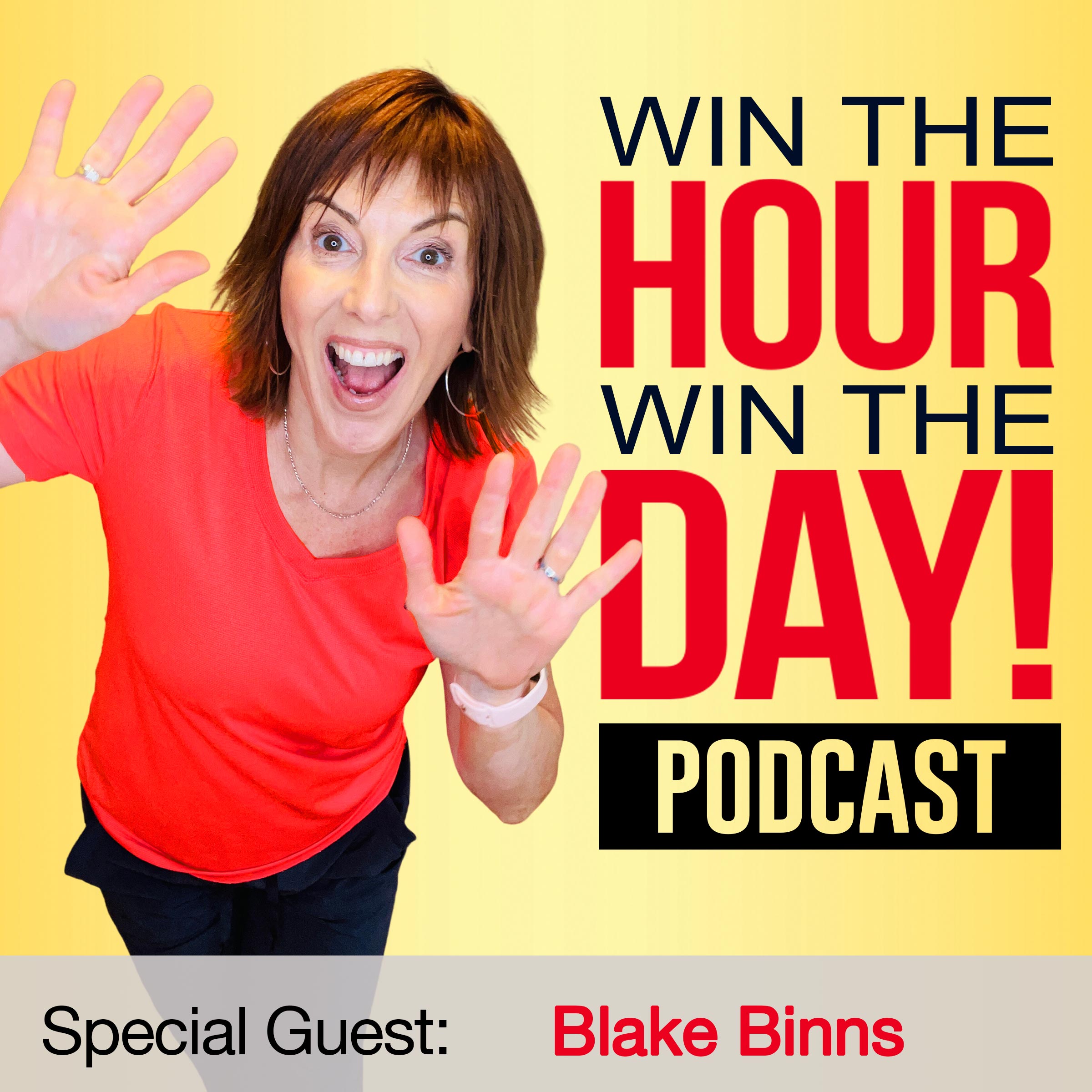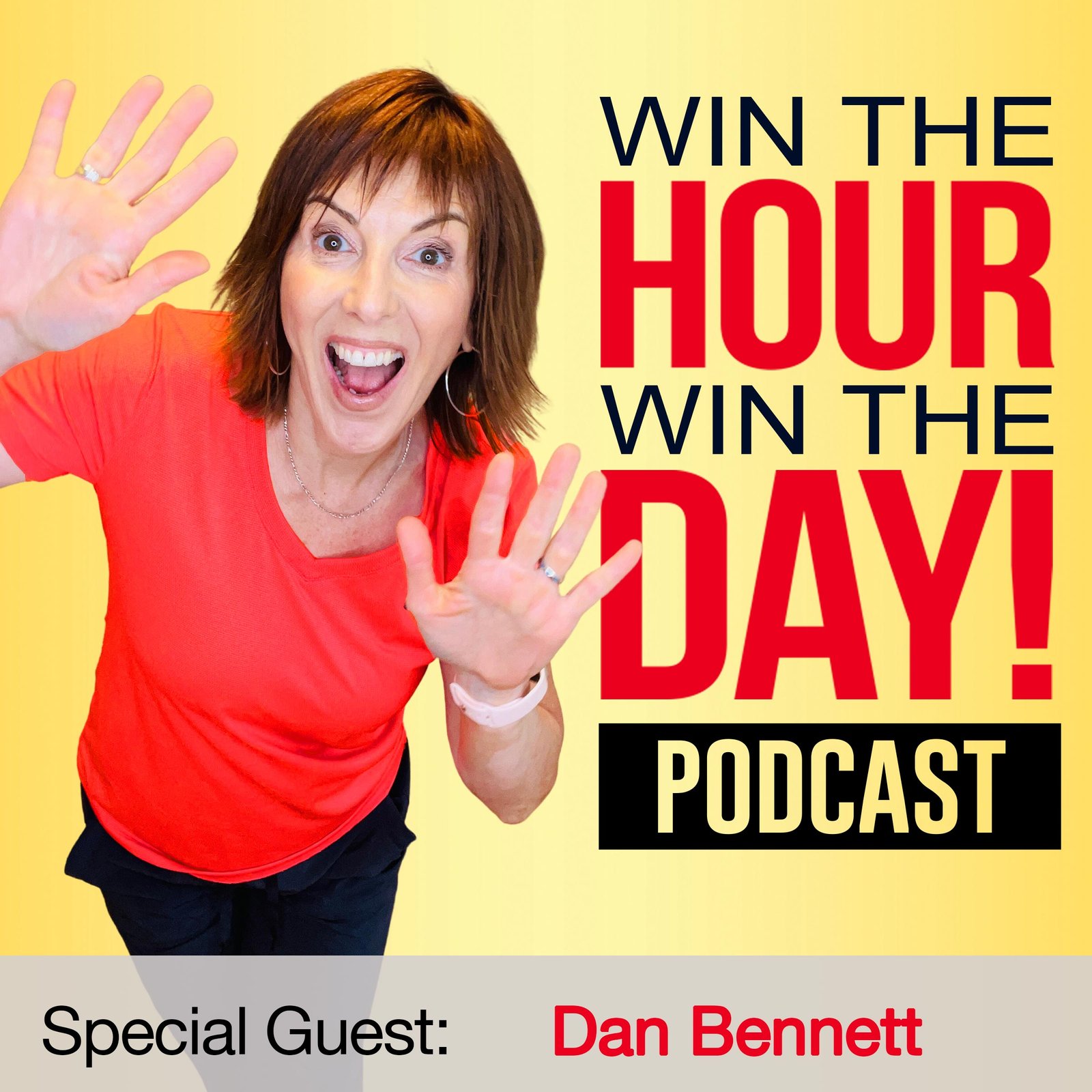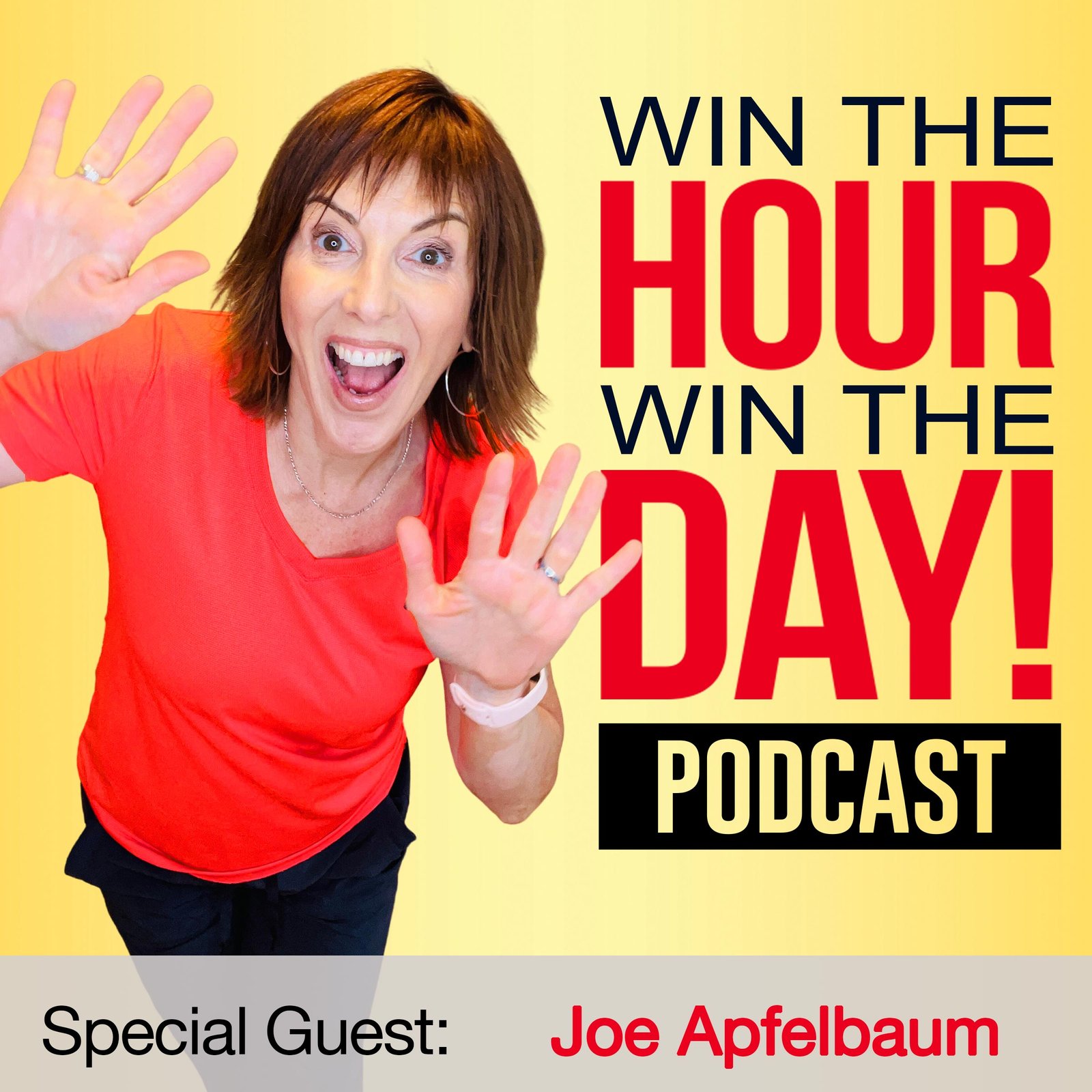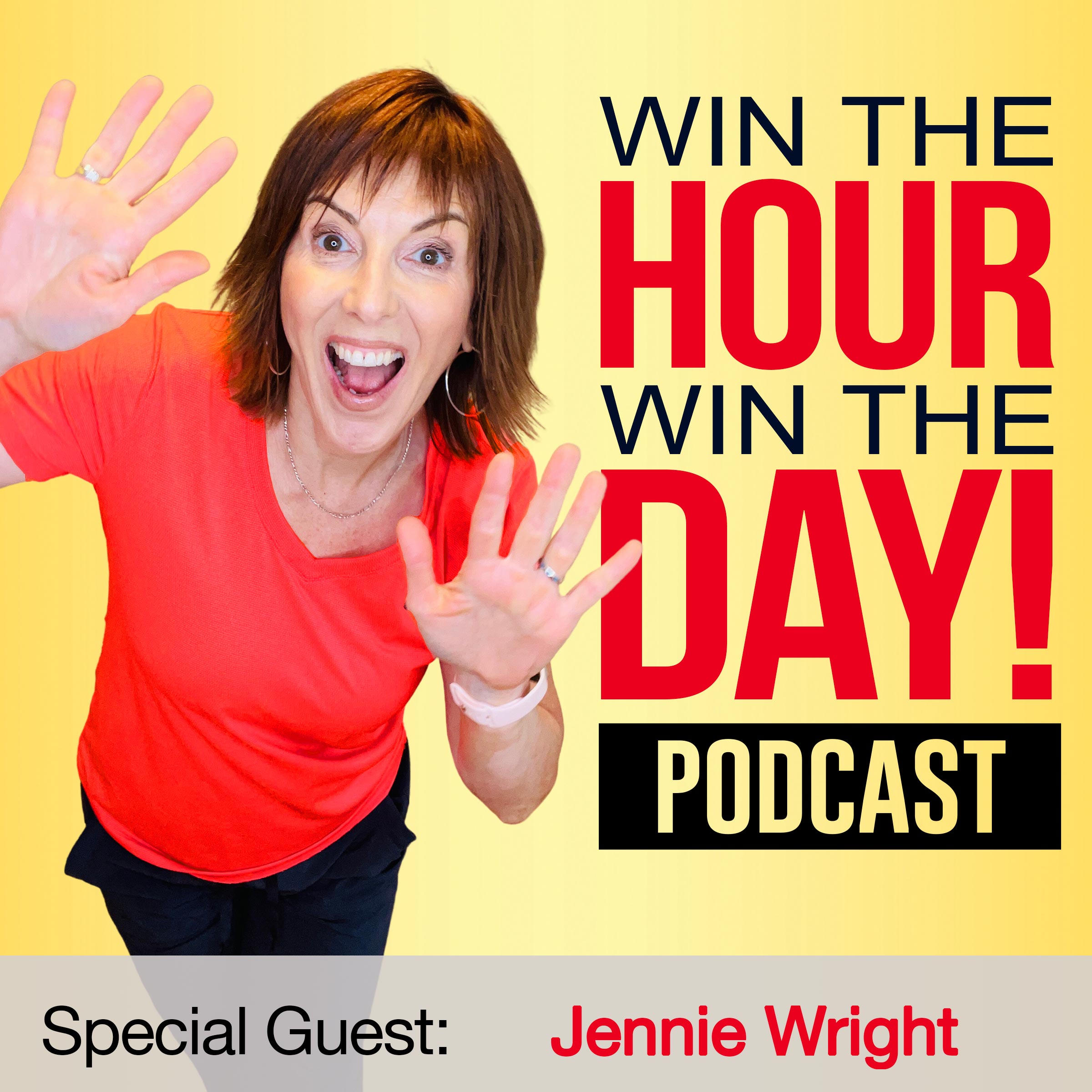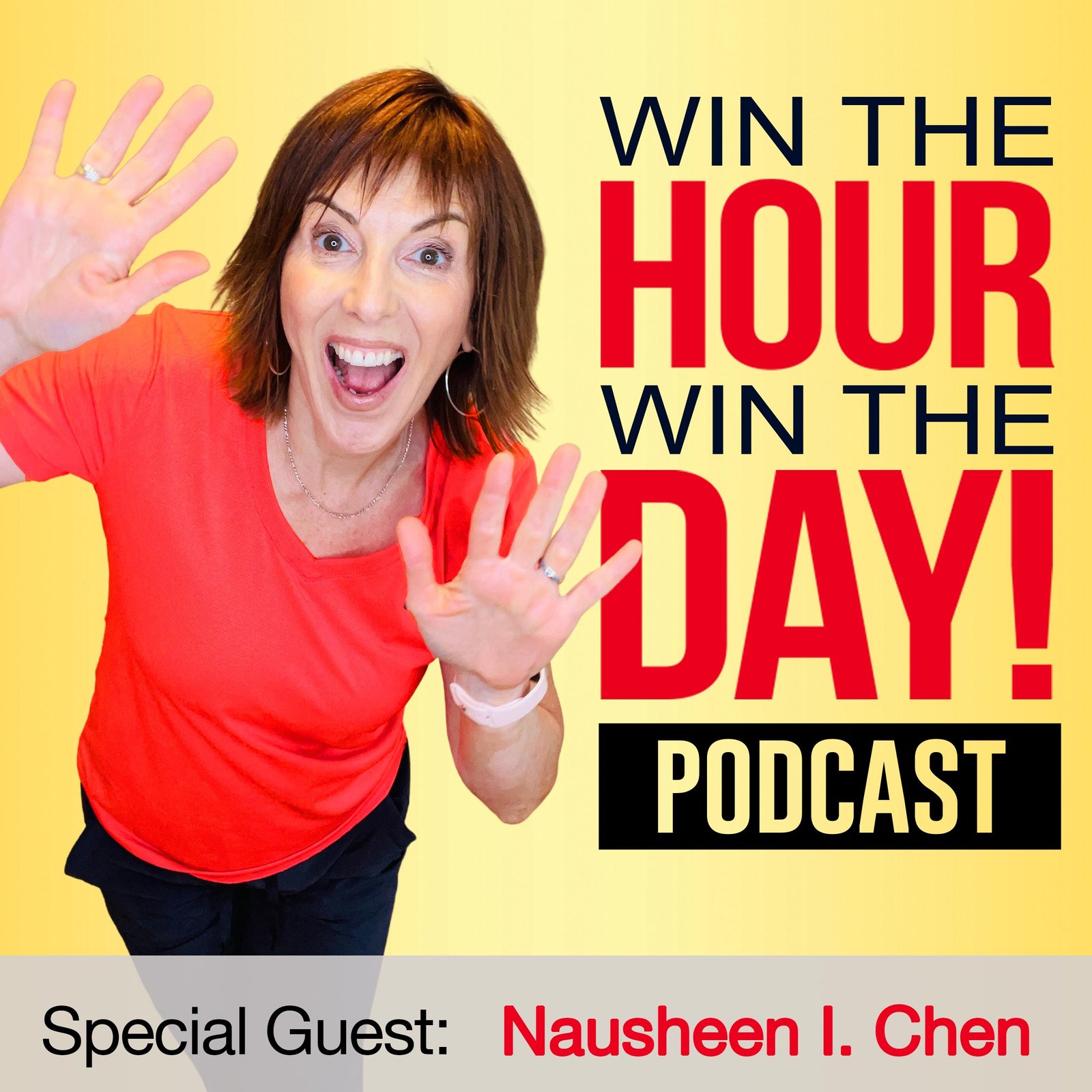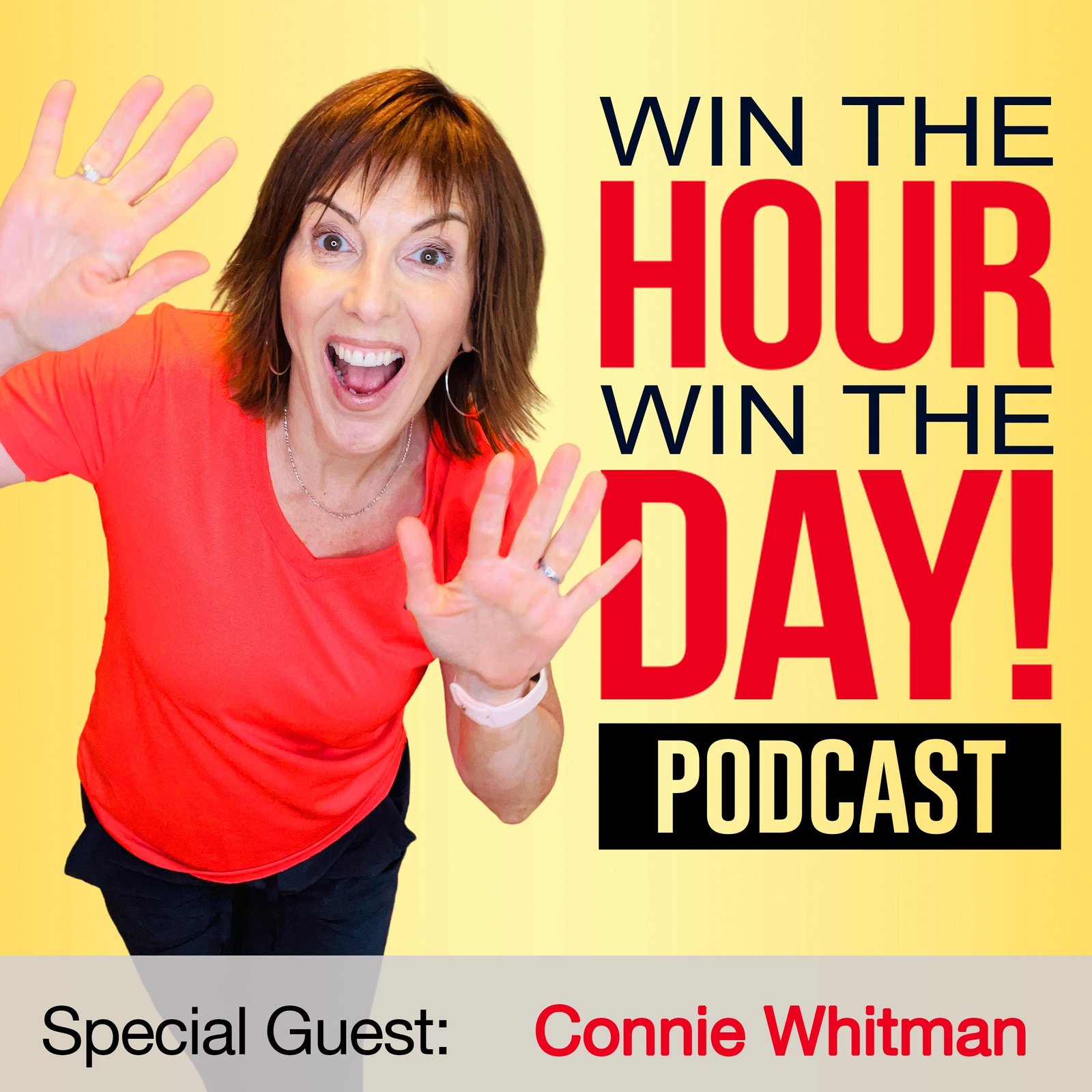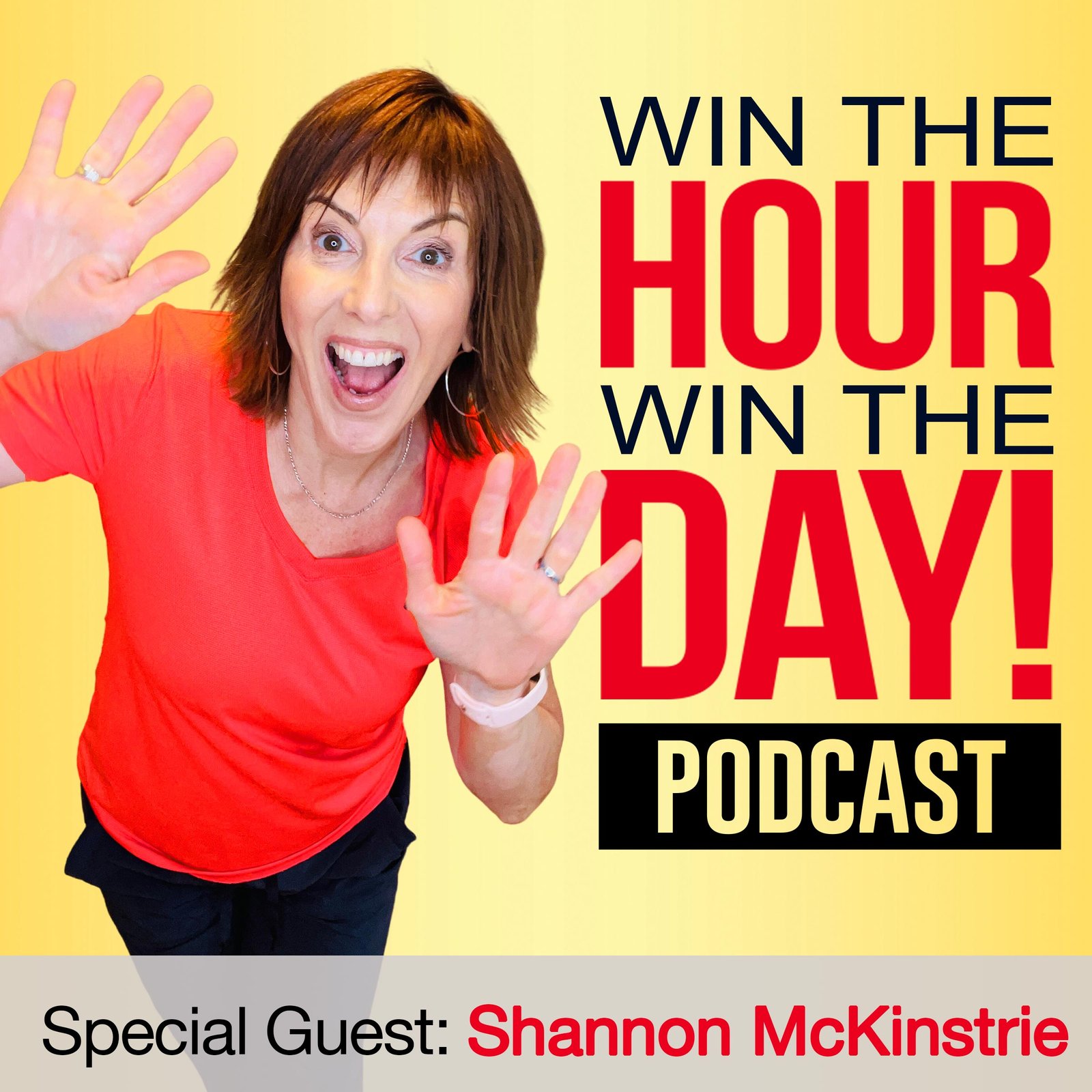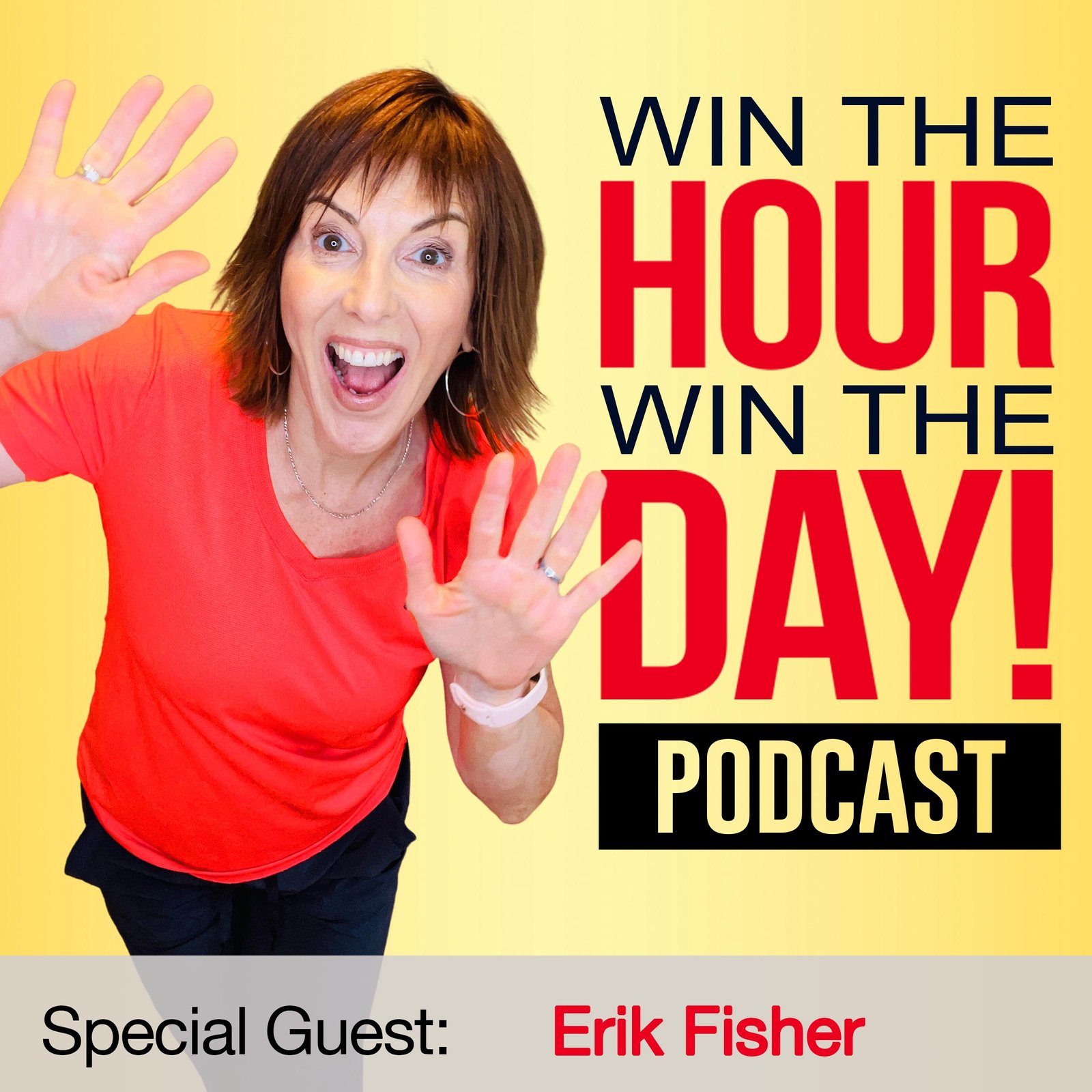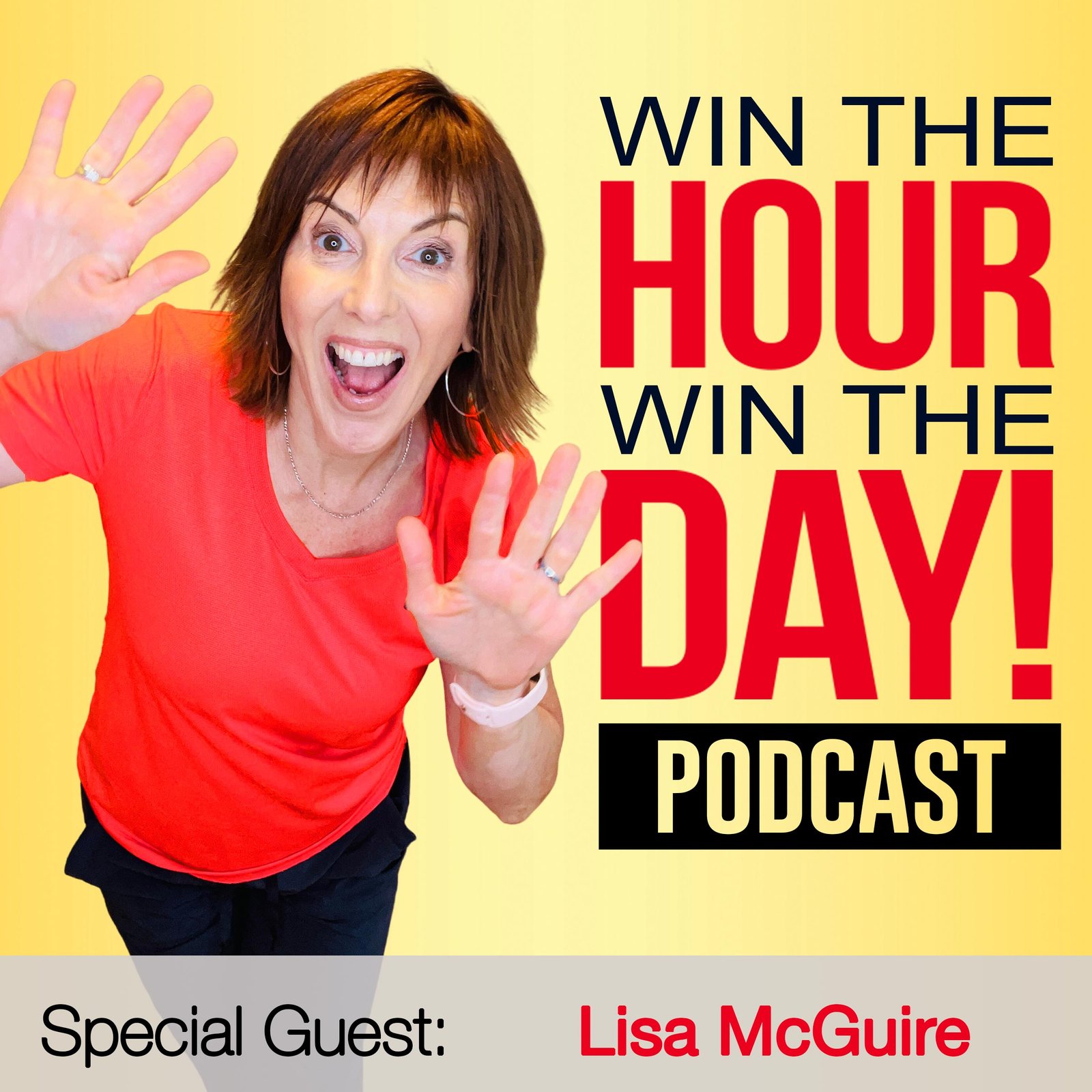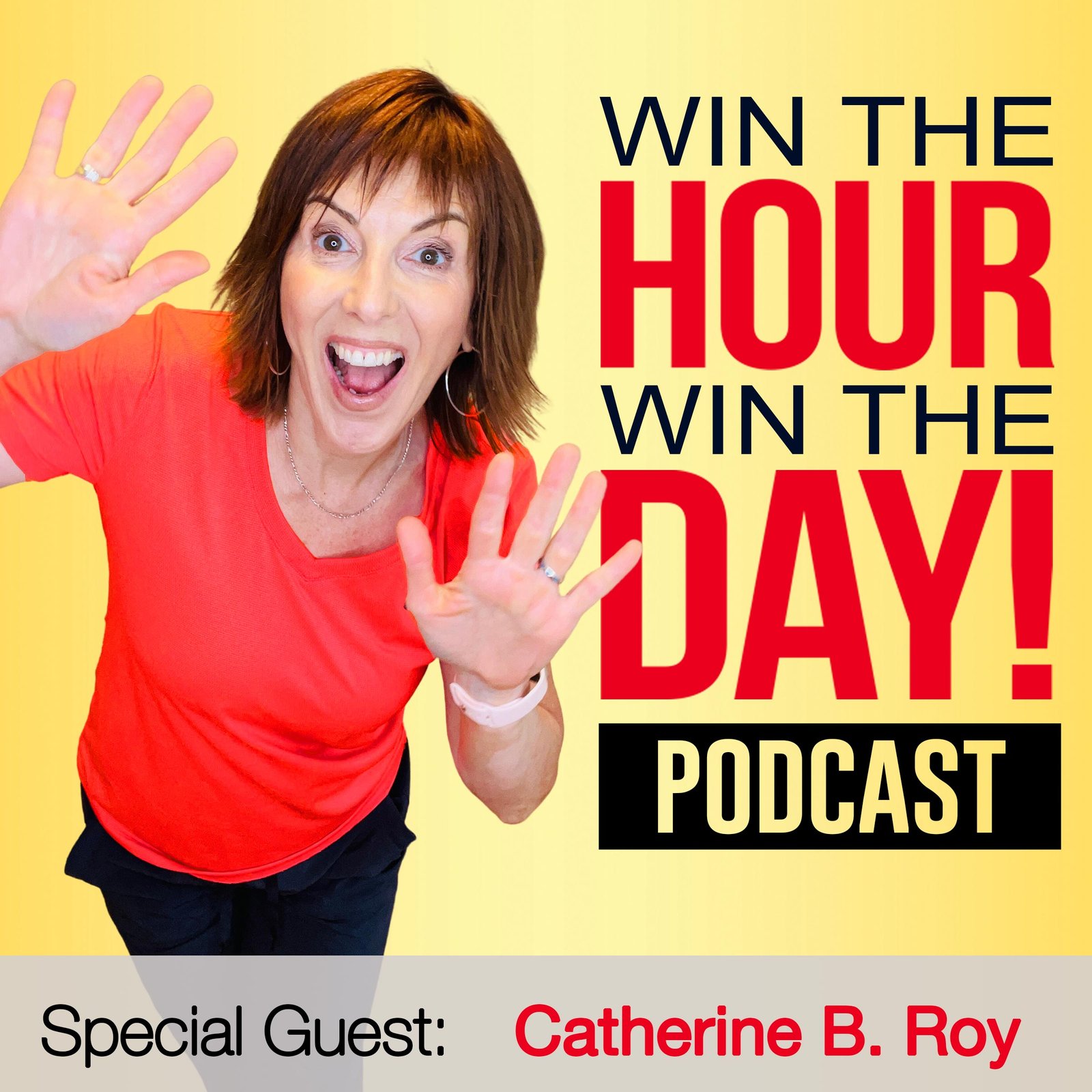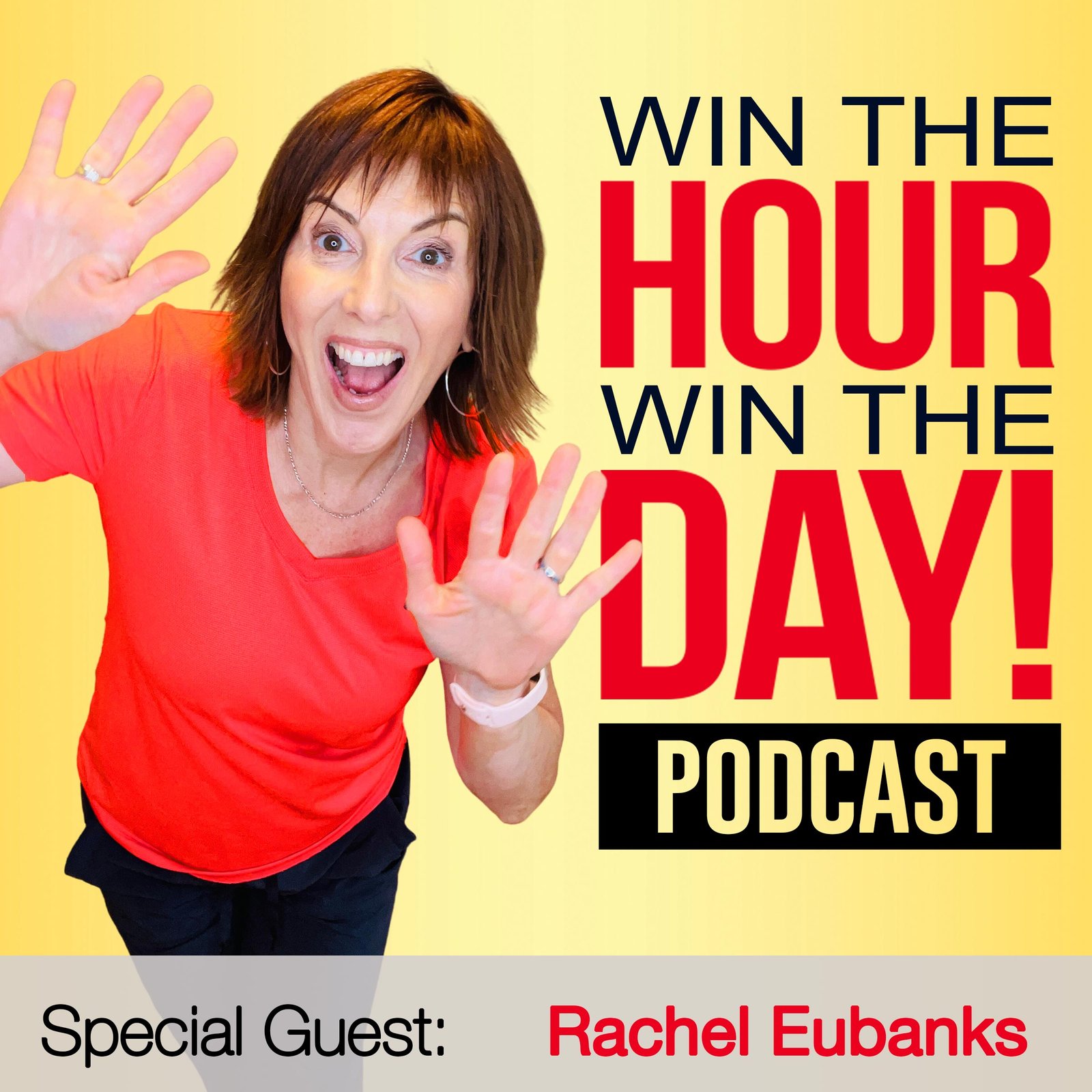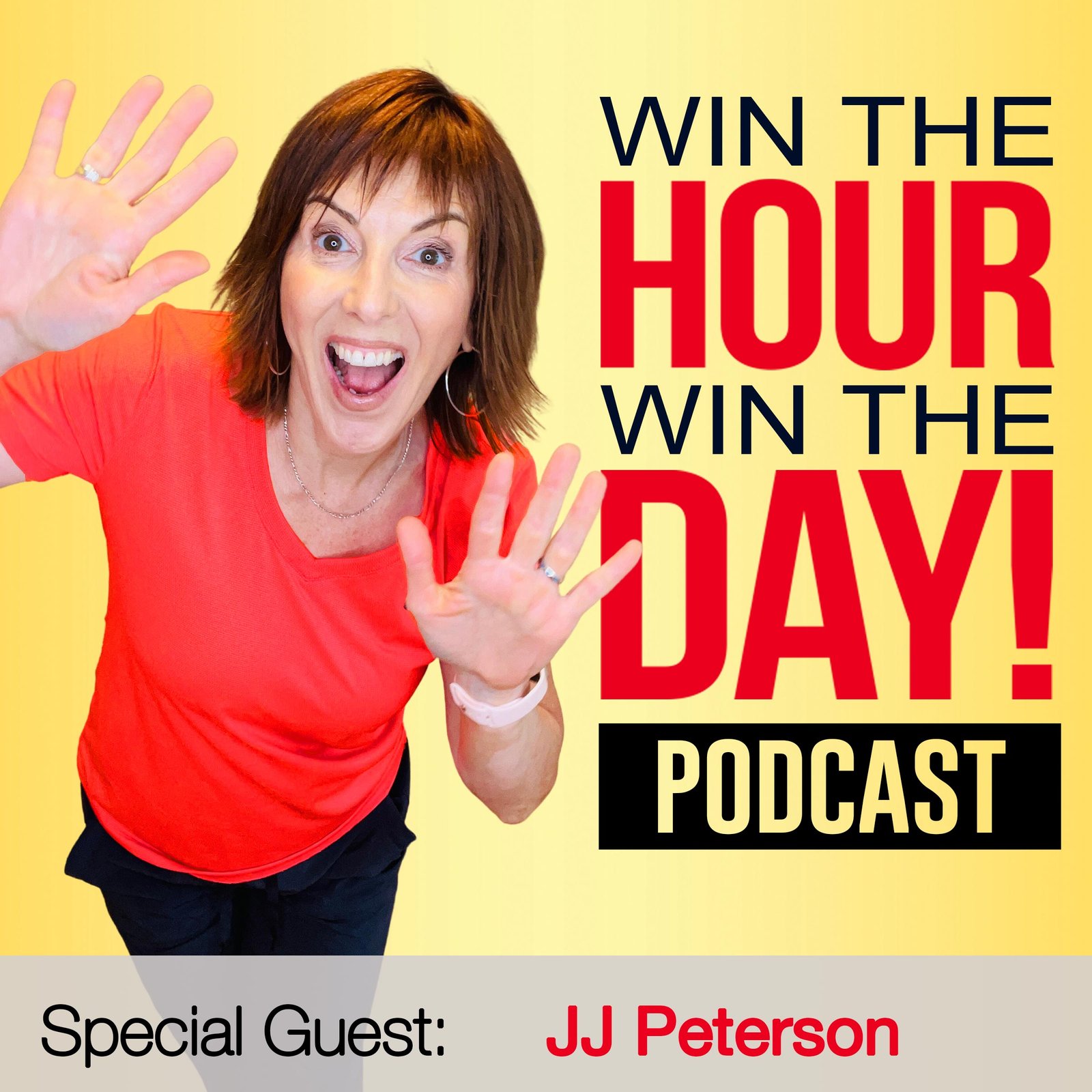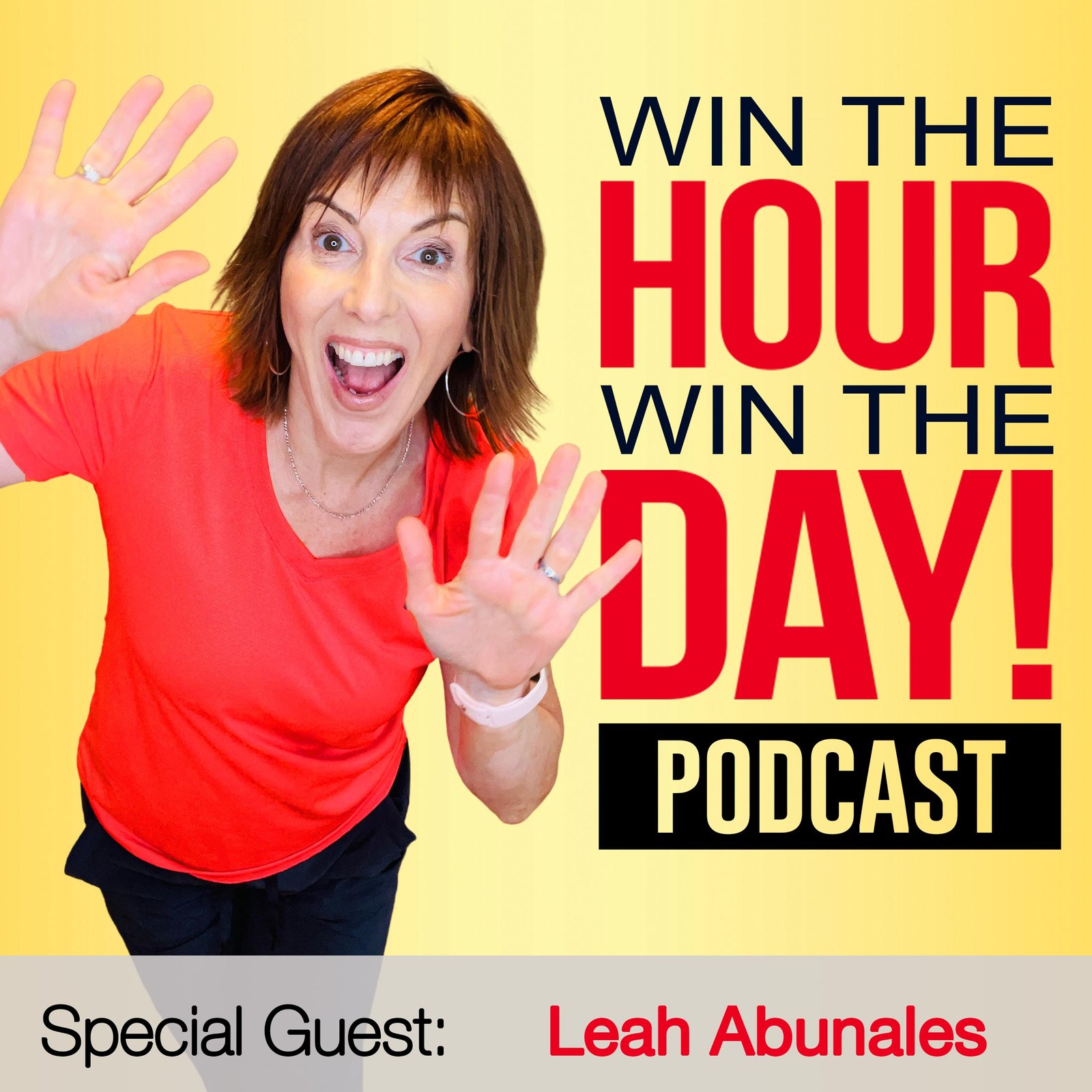Episode Summary This week’s episode of Win The Hour, Win The Day Podcast is...

Are You Ready For Your Next Big Win?
Know your entrepreneur personality and I’ll take it from there!
Recent Podcast Episodes
Preventing Burnout with Smart Work Tools! with Kris Ward
Episode Summary This week’s episode of Win The Hour, Win The Day Podcast is...
Master Social Selling: Heidi Medina’s Strategies for Engagement
Episode Summary This week’s episode of Win The Hour, Win The Day Podcast is...
Boost Productivity and Master Storytelling! with AmondaRose Igoe
Episode Summary This week’s episode of Win The Hour, Win The Day Podcast is...
Master Video Marketing: Top Tips for Entrepreneurs with Dan Bennett
Episode Summary This week’s episode of Win The Hour, Win The Day Podcast is...
Boost Your LinkedIn Strategy with AI Tools for Enhanced Productivity! with Joe Apfelbaum
Episode Summary This week’s episode of Win The Hour, Win The Day Podcast is...
Mastering Personal Branding with NLP Techniques! with Olesija Saue
Episode Summary This week’s episode of Win The Hour, Win The Day Podcast is...
Innovative Lead Generation and Email Automation Secrets with Jennie Wright
Episode Summary This week’s episode of Win The Hour, Win The Day Podcast is...
PR Strategies for Diverse Entrepreneurial Impact! with Jennifer Singh
Episode Summary This week’s episode of Win The Hour, Win The Day Podcast is...
Convert More Clients on LinkedIn with Richard Moore
Episode Summary This week’s episode of Win The Hour, Win The Day Podcast is...
Master Business Growth on Pinterest with Meagan Williamson
Episode Summary This week’s episode of Win The Hour, Win The Day Podcast is...
24/7 Sales Boost: Video Marketing Secrets with Alex Sheridan
Episode Summary This week’s episode of Win The Hour, Win The Day Podcast is...
Master Public Speaking Tips with Nausheen Chen!
Episode Summary This week’s episode of Win The Hour, Win The Day Podcast is...
Beating The Burnout With Connie Whitman’s Success Story
Episode Summary This week’s episode of Win The Hour, Win The Day Podcast interviews,...
Craft Your Social Media Content Strategy With Shannon McKinstrie
Episode Summary This week’s episode of Win The Hour, Win The Day Podcast is...
Boost Your Productivity with AI Tools: A Deep Dive with Erik Fisher
Episode Summary This week’s episode of Win The Hour, Win The Day Podcast is...
Boost Visibility: Repurpose Content and Leverage Podcasts With Christina Lenkowski
Episode Summary This week’s episode of Win The Hour, Win The Day Podcast is...
Master Personal Branding & Storytelling with Lisa McGuire
Episode Summary This week’s episode of Win The Hour, Win The Day Podcast is...
Boost Business on LinkedIn with Catherine B. Roy’s Strategies
Episode Summary This week’s episode of Win The Hour, Win The Day Podcast is...
Scale Your Business: Optimizing Virtual Assistant Services with Kris Ward & Rachel Eubanks
Episode Summary This week’s episode of Win The Hour, Win The Day Podcast is...
Affordable PR Mastery: Crystal Richard Unveils Modern Techniques
Episode Summary This week’s episode of Win The Hour, Win The Day Podcast is...
Mastering Business Storytelling with JJ Peterson’s Guide
Episode Summary This week’s episode of Win The Hour, Win The Day Podcast is...
Revamp Your About Page: Guide to Personal Branding
Episode Summary This week’s episode of Win The Hour, Win The Day Podcast is...
LinkedIn Mastery and Video Marketing Secrets with Alex Sheridan
Episode Summary This week’s episode of Win The Hour, Win The Day Podcast interviews,...
The Systems and Processes Playbook: Insider Secrets to Streamlining Your Small Business with Leah Abunales
Episode Summary This week’s episode of Win The Hour, Win The Day Podcast interviews,...
Master The Art Of Conversion Copywriting! with Danielle Weil
Episode Summary
This week’s episode of Win The Hour, Win The Day Podcast is sponsored by Win The Hour, Win The Day’s Signature Coaching Program the Winners Circle. Kris Ward who helps entrepreneurs to stop working so hard interviews, Danielle Weil.
Danielle Weil Gives Us Actionable Copywriting Strategies for Immediate Results!
Learn:
-How to effortlessly create fresh content in a short amount of time.
-Why starting your copywriting with questions can hinder your success.
-Uncover ninja copywriting hacks to save you valuable time.
-Discover the power of leveraging Chat GPT.
And so much more that will blow your mind!
Scale Your Business Scorecard
https://bit.ly/3Iyf4AU
Win The Hour, Win The Day! www.winthehourwintheday.com
Podcast: Win The Hour, Win The Day Podcast
Facebook: https://www.facebook.com/winthehourwintheday/
LinkedIn: https://www.linkedin.com/company/win-the-hour-win-the-day-podcast
Win The Hour, Win The Day Winners Circle: https://winthehourwintheday.com/winners-circle-masterclass
You can find Danielle Weil at:
Website: https://www.dwcopy.com/subjectlines/
LinkedIn: https://www.linkedin.com/in/danielleweil/
Facebook: https://www.facebook.com/danielle.weil
Instagram: https://www.instagram.com/daniellekweil/https://www.instagram.com/chrisnwest/
Win The Hour Win The Day
https://winthehourwintheday.com
Danielle Weil Podcast Transcription
[00:00:00] Kris Ward: Hey everyone. Welcome to another episode of Win The Hour, Win The Day. And I am your host, Kris Ward, and today am excited to talk to Danielle Weil about Copywriting. Now hold on though, that may not sound sexy, but it’s gonna be all kinds of fun and she’s gonna really give us some simple tactics to bring us clarity and results.
[00:00:18] I know when you hear copywriting, it sounds a little heavy, but this is going to be a game changer for you so stay with us just a few moments. All right, Danielle, welcome to the show.
[00:00:27] Danielle Weil: Thank you for having me.
[00:00:29] Kris Ward: Oh, I’m excited. Okay, Danielle, let’s just dive in because my listeners are all about, really effective and tangible results, and I think you have them. So one of the things that I love that you talk about is don’t start with a blank page.
[00:00:45] Danielle Weil: Never start okay with a blank page. There’s no reason to because that is the thing that is going to kill your creativity more than anything else. That blank canvas, that blank page, the possibilities are endless and you don’t know where to start.
[00:01:00] It’s always easier if you give yourself something to model, something to start with, whether it’s something that you’ve written in the past or something that someone else has done, whether it’s be someone in your space or someone in a totally different market. So having that file of pages, emails, posts that you liked, and saving them and building out that swipe file means that when you go sit down to write, you don’t have to start digging for what to say.
[00:01:32] You actually go ahead and model those swipes to give yourself ideas. We don’t wanna copy, we don’t wanna plagiarize, but we do want to find that rhythm of the words to actually make it easier. Give us some something to start with.
[00:01:48] Kris Ward: Yeah, you bring up some really good points. So let me unpack a few of them, cuz for starters I find you don’t even look at the blank page, you look at the ceiling you’re just looking up like, ah, I gotta do this.
[00:01:57] So there’s the ceiling you don’t wanna be looking at. And I do think times that I’ve now had my swipe file. That I could see something that’s a totally different topic, but I can insert like my noun or my verb. Like I saw somebody actually in this case it was a video, but it gave me an idea for writing copy.
[00:02:15] And she was talking about, she was a therapist talking about all these little crunch up pieces of paper she was throwing in a basket and she was saying, this is this part of your personnel, blah, blah, blah. And then it overflows. And I thought, oh, I could do that with your workload. This is this responsibility in this one, and now it’s overflowing in the basket.
[00:02:32] So I took that idea that she had, but I wasn’t plagiarizing cuz we’re completely different fields, but yet it inspired me and made me write something in that tone.
[00:02:43] Danielle Weil: Exactly. And it’s almost better to go to people who do something completely different than what you do because then you can be sure that you’re not copying them, you’re not infringing on their territory and that you are making connections. Metaphors are everywhere. Ideas are everywhere. Analogies are everywhere. And the more that we have our radar on to start capturing them and putting them at a place where we can come back to them later, the less looking at the ceiling you are gonna do.
[00:03:15] Kris Ward: Yeah, that’s a really great point. And also to what I found this is sounds ridiculous, but you sometimes forget the things that you’ve done. So one of the things is if you have them in Google Docs, like sometimes I’ll have to write something about. Okay. What’s, I don’t know what’s five reasons? When should you outsource? And then I’ll just key that into Google Docs and then a whole bunch of things I have post or I have blocked, or I have whatever will come up.
[00:03:41] And I’m like, oh, that’s a really good point. Let me build on that one and redo something. And I think that’s super powerful cuz I think to your other point is when you look at somebody else doing similar to what you do, it’s really easy to get caught up and go, oh, their stuff looks better. And it’s not even about plagiarizing, it just beats you up a little bit.
[00:03:57] But here’s a, I’m ashamed to tell you this story, Danielle. It’s really funny. We, and we’ll dive into this a little bit more with ChatGPT, but I was looking for something to repurpose on chatGPT. So I actually went into my book Win The Hour Win The Day, and I was like, oh, whatever. Let me see if I can repurpose this, but repurpose it.
[00:04:15] I was on page four and I was copying and pasting and going. That’s a good point in me. This will make a good post. This would make a good post. And I was reading the book, like I ha, like I, this is the first time I’ve ever seen it. Of course I wrote it. I had to get it edited, I had to reread it so many times I was done with it and now there’s some space.
[00:04:35] And so I went in, I was like, I. Why am I not talking about this stuff? I wrote the book. It’s in here. So sometimes you forget the stuff that you have cuz you’re such in this hunger search of thinking. Either you think I already said it and it didn’t land in somebody’s ears the way I wanted to. But there you have so much wealth within is I what I keep learning.
[00:04:55] Danielle Weil: I think so too. And the truth is the key points that your people need to make, you are gonna say them over and over again. Yeah. You’re probably gonna get a little bit bored. And that’s why I love the idea of finding new stories, new analogies new quirky ways in to making the same point, because they’re gonna stay the same. If your audience is the same and your offers stay the same, and that’s the, that’s when you can really start to repurpose, like you said, go back into your book, your blog posts, the things that you’ve posted, your videos, and take the same idea and find a new way into it.
[00:05:31] Kris Ward: Yeah, because also what I found is, have you ever done this where you had something that you like to eat and you made it like three, four weeks in a row. Oh, you love it. I’m gonna have this every Sunday. And then you think, okay, I’m, let’s take a break from that. And then you go to somebody’s house six months later and you’re like, I.
[00:05:45] Oh, I used to make this all the time. Why did I stop? So for me, when I revisited the book, you are right. I was like, oh, I said this a thousand times. Who cared? This is done. But then when I came back, it’s oh, I haven’t said it this way in quite some time. And that was effective. Let me try it now where I’m doing TikTok videos and I wasn’t at the time I wrote the book, so I think, you know what’s old is new again.
[00:06:07] So even though you feel like you’re repeating yourself you do that and then you move on. But you can also refresh it as well.
[00:06:13] Danielle Weil: You can, and that feeling that you’re repeating yourself, not everybody is going to see every piece of content. No. You should have new leads coming into your business all the time that need to hear those things.
[00:06:23] Yeah. And so we might get bored saying it, but the more that you can get it into, yeah. Whether it’s an automated sequence or a book or a place that they go to get caught up on that content and hear those messages over and over again, the easier it becomes.
[00:06:39] Kris Ward: So when you talk about these swipe files, you gave a good suggestion about having that for an email. Can you expand on that one?
[00:06:46] Danielle Weil: This is my secret hack. This is what I do when I am writing a sequence. Like I write sequences of up to 50 ish emails for clients, and you’ve gotta get your ideas, you’ve gotta get new ideas, you’ve gotta write a bunch of subject lines. What do you do? So I have a separate email address that I’ve signed up to a whole bunch of lists of people in the space. People who I think are smart writers people whose emails I like to open, people who I think write really good subject lines. Whoever it is for you, go subscribe to their list. The trick is this, I do not check that email address unless I am actively writing.
[00:07:24] Kris Ward: Okay.
[00:07:24] Danielle Weil: So what happens is you see 5,000 unread messages, and what you do is you go in and star, they’ll put a little star if you’re in Gmail or mark the ones that got your attention, the ones that you would open that mirrors the behavior of your client as, or your audience as they are looking through their crowded inbox.
[00:07:47] You want your emails to pop, you want your emails to be the ones they open, and so you’re borrowing, modeling, getting inspiration from the subject lines that you would open yourself.
[00:07:59] Kris Ward: Yeah, that’s a good idea because I do have an email address that those emails go to, but there’s some other stuff in there and then you have to find it, and then you go, oh, I should remember that title.
[00:08:08] And it does get diluted or you just go in there and you’re like, oh, now I’m seeing something on LinkedIn. Somebody said about me, whatever. So to have that in isolation by itself, okay, I gotta. Everybody amuse yourself while I’m writing that down. Cause I’m gonna do that. Okay. Okay. All right. Now that lends itself to what you call having some constraints. When your constraints sounds confining and on fun, if that’s a word, tell me how constraints works for us.
[00:08:37] Danielle Weil: So I call it the power of constraints because it’s that same mechanism behind the blank page. A blank page is intimidating having a hundred flavors of jellybean to choose from is also really intimidating.
[00:08:51] When you have too many options, our brains get confused. We love simplicity, and so you are doing yourself a favor actually, when you give yourself constraints around your writing, around the process of creating content and copy. And there’s three ways to do that. One is giving yourself a time constraint, right?
[00:09:11] Set a timer for 20 minutes. It’s the same reason you get all the questions done in standardized tests, or if like you’ve got a deadline, you’ve gotta hit it. It’s putting that time constraint around it. And whatever is done by the end of that 20 minutes is what it is. You can fix it up later maybe, but that’s it.
[00:09:28] And once you get in the habit of doing that muscle, that’s when it becomes easier. Second constraint is topic. Now this is where I have told people to pick the first random thing on their desk and write an email about it when they are not inspired. I’ve got, whether it is a book or you can open a book to a random page and pick a word.
[00:09:51] You could have really anything. I have written emails about endangered species, and this is where ChatGPT comes in. We can talk about that in a sec to get inspired around topic. Okay. The third one is template. So it’s really having a way that you write emails that is more or less the same every time.
[00:10:11] You know where you’re going. So you know that you’re gonna have a hook, you’re gonna have a story, you’re gonna have a takeaway, and you’re gonna have a call to action.
[00:10:19] Kris Ward: Okay. Okay. So that’s powerful stuff. So I think what you’re doing here, what you’re educating us on is… We all go, oh no, I have to do some writing and it’s gonna be labor intensive and I don’t wanna do it.
[00:10:32] And there’s all this stuff. And so then the, it’s almost like taking a glass of water and just spilling it all over the floor. It goes everywhere, right? It’s don’t. So what you’re saying is don’t look at it, blank page, have an email with address with all your things in there that could inspire, that you could swipe from and be, engaged and say, yeah, I could do it from this different angle and then, and we’re all about this.
[00:10:53] Then putting a time constraint on it. Because listen, work feels the amount of time you give it Win The Hour Win The Day is all about that. Don’t make me bore you with the signs of how the brain processes information and it’s and when you say, oh, I’m just gonna write this morning, what does that mean?
[00:11:09] It means nothing. If you say, I’ve got one hour to get these two emails done for my onboarding copy, then when, a text or distraction comes floating by a digital mosquito, you’re like, I don’t have time for that. I’ve got 20 minutes left and this has to get done, which I cannot stress to people enough.
[00:11:26] Attention residue, decision fatigue. You’ll be so much more productive and effective if you stay on task. Everyone talks about multitasking. Nobody talks about this word. Write it down. Single tasking. Single. So single task. Danielle, you’re preaching to the choir on that one, so I love that. Okay. So those are some parameters of safety to ensure that we are creative, which I think is super important because so many times people think being creative means like standing out in a field, swinging your arms, like the sound of music, and it’s like you have to put things, buffers in place to support the creativity.
[00:12:03] Danielle Weil: Yeah. It’s not about pounding away at the keyboard yeah. It’s writers write every day. And I have a background in English literature and creative writing, and so a lot of the techniques that I’ve developed come from that world where you’re in a creative writing class and you’re given a prompt and you’ve got 20 minutes to write a story using that prompt.
[00:12:21] That is exactly what we’re doing here. Okay. We’re pulling these ideas of creative writing is actually putting constraints around your creativity because otherwise you go all over the place.
[00:12:31] Kris Ward: Yeah. Perfect. Okay, so we’d be amiss if this day and age somehow chatGPT did not come into the conversation cuz it’s like it comes up, it bleeds into everything right now. So when we wanna talk about content and creative elements, where does that fit in your sphere?
[00:12:50] Danielle Weil: Right now I think we’re all still in the phase of figuring out what it can do and what it can do changes so quickly that, what I say now might not be true even a week or a month from now.
[00:13:02] Kris Ward: Yes.
[00:13:03] Danielle Weil: So with a grain of salt, but I have been using it in really specific ways because in the beginning everyone was like, oh, it’s writing all my content for me. It’s great. And I tried to get it to write like me and I couldn’t. And then I realized I almost didn’t want it to. At this point in time. So what I’ve been using it for is actually for those places where I get stuck, whether it’s I don’t have an idea for a story or a metaphor. I know where I wanna go, but I don’t know how to get there.
[00:13:31] Give me 10 ideas for stories about second chances, and it’ll gimme a whole bunch of ideas. They’ll be like, Ooh, we like that one. Tell me more about that one. And it will essentially build out the story for me in a way that I could not have pulled out of my brain. So I almost say treat it like an intern.
[00:13:48] Kris Ward: Yes. When you said that…
[00:13:49] Danielle Weil: who’s going to replace you?
[00:13:51] Kris Ward: I did pass that on to my team and I thought it was really helpful in Sage advice and for me. So I had this experience yesterday where somebody asked me on LinkedIn, I had some posts about outsourcing and building your WIN team and all this stuff, and she said, it’s really great points, Kris, but are the people from the Philippines getting a fair wage? And I thought, oh, you know what? I forget to dress that all the time. It’s so important. So I responded and said, yes. In the Philippines, their minimum wage is $10 US per day. And conservatively, even if you start them on, working for you at six US dollars now that’s really great for you.
[00:14:24] And I said a lot of my clients then are able to scale their business and reinvest back in their team and the teams get raises. So it’s a win-win. So I took that question and I put it in chatGPT and I thought, oh, I should be, cuz we always step over the stuff that people are asking us to get to what we think is the more advanced, detailed stuff.
[00:14:41] So I put it in chatGPT, and I said, here’s the tone. Follow my tone. Write at a grade six level so it’s easy to read the scroll. And I want you to come up with 10 more questions similar to this, with the concerns of outsourcing. And it did, it gave me questions that I knew but had forgotten that I should be addressing.
[00:15:00] So it does, I think it’s, it, I think it just adds to oh yeah, as I always say, oh, I forgot. I knew that. Or yeah, people do ask me that and I address it. But I’m stepping over it to get to what I think is a real content. So I think it’s very useful in that capacity.
[00:15:17] Danielle Weil: It’s definitely useful for getting to pain points and doing market research. The key here is to give it a role. So you need to tell it to be a market researcher or a copywriter or
[00:15:28] Kris Ward: Right.
[00:15:29] Danielle Weil: you’re the persona of your ideal client a business owner, whatever that is, and giving it the role and then the task, and then giving it the boundaries, meaning when I ask it to write copy, I have to tell it.
[00:15:41] Please do not use questions. Because we don’t like questions and copy. Okay. And for some reason, ChatGPT likes to put tons of them in there.
[00:15:48] Kris Ward: Oh, that’s a good tip. You know what, when you say that, I now realize you’re right. Good copy doesn’t have questions, but I don’t think I knew that until you said that.
[00:15:58] Like it’s one of those things that I didn’t know how to interpret. But now that you pointed out, you’re right. Of course
[00:16:03] Danielle Weil: you’re reason why
[00:16:04] Kris Ward: hold on. I love when I invite guests of their area specialties on my show, and then I tell them, oh, you, you are right. That makes no sense. But anyhow, you, I meet it with praise and affection
[00:16:16] Danielle Weil: and I definitely take it that way.
[00:16:18] Kris Ward: Okay.
[00:16:18] Danielle Weil: And the thing about questions, this is another tip that, that I see a lot of people doing, and I see it in a lot of copy and it’s my, one of my little pet peeves. Okay. Which is when you are using too many questions in the beginning they tell you, oh, dig into the pain points of your people.
[00:16:34] Are you this, are you feeling so you’ll either do that or you’ll have the assumptions you are blah, blah, blah. You are feeling blah, blah, blah. You struggle with, and both of them are no-nos for the very reason that it will just trigger our subconscious to go no, and people will check out.
[00:16:54] They’ll either get defensive that you’ve made assumptions about them, or they’ll answer no to your question in their brain.
[00:17:01] Kris Ward: Okay. So like also on webpages, a lot of times they have you do that. Are you this, are you that, are you tired of working? Are you tired of being tired? Are you tired of working too hard? And that’s like at the top to get the hook.
[00:17:12] Danielle Weil: Yeah. You want to actually describe the problem. Okay. I’m not saying not to describe the problem. It’s a really simple shift. Okay. It’s actually just two words. If you…
[00:17:21] Kris Ward: okay.
[00:17:22] Danielle Weil: Instead of asking a question, you ask them if you are this. If you’re struggling, if you’re feeling tired, because the “if” leads to a “then”,
[00:17:35] Kris Ward: oh, that’s some high-fi, high flying flu, not okay. Ninja stuff here. So you’re saying… Instead of, “are you”, so then it’s yes or no, but “if you” then I guess it glides or guides you mentally to the next part of it, “then”
[00:17:52] Danielle Weil: Exactly.
[00:17:53] Kris Ward: Okay.
[00:17:53] Danielle Weil: Because it leaves room for them to say, no, that’s not exactly me, but they’ll keep going because you haven’t checked them out of it.
[00:18:00] Kris Ward: Okay. Okay. Wow.
[00:18:01] Danielle Weil: That’s, so if you are this, okay. If you feel this, if you struggle with, then you’re in the right place, then you need to know. Then this happens. You’re meeting them where they are and then leading them very gently to where you want them to be.
[00:18:18] Kris Ward: I feel like I’m a pretzel and you just flatten me out.
[00:18:21] Now I’m like a pretzel stick instead of a pretzel. I’m like, oh, cuz that is so I can so gentle, but I can see the shift. It seems like it would make a difference.
[00:18:32] Danielle Weil: It does make a difference. Okay. It does make a difference.
[00:18:35] Kris Ward: Okay, so let’s hop on that vein for a second. Why don’t you give us a couple other things that we don’t know that we don’t know, and some of our common mistakes.
[00:18:44] Danielle Weil: These are really like nuanced things. Okay. But the difference, for example, between learn and discover.
[00:18:52] Kris Ward: Okay.
[00:18:53] Danielle Weil: You’re going to, you always see, oh, here’s what you’ll discover. Here’s what you’ll get. Here’s what. Because what’s happening under the surface is we have associations about learning.
[00:19:04] Kris Ward: Oh. So we should be saying you’ll discover instead of you’ll learn.
[00:19:07] Danielle Weil: As being hard learning is hard. We want it to subconsciously even, and this happens, right? Again, people are not aware that this is happening, but the word moves them to feel like it’s easy. You’re gonna discover, we’ll reveal, like you don’t have to do it, you’ll just get it.
[00:19:25] Kris Ward: Oh my gosh. Okay. I love this because there are times where I’m writing something and I know I’m using a word. I don’t wanna use like a, we’re trying to figure out how many different ways you can say course or, there’s some times where you’re just like, ah, like module training course.
[00:19:39] It’s ah, what am I gonna say? But I don’t want it to sound heavy cuz it isn’t. Man, this is ninja stuff. Okay. So say discover instead of learn. All right. Give us a few more of those if you have them.
[00:19:50] Danielle Weil: Sure. Okay. So you wanna make sure that the things that you’re emphasizing in copy are not negative words
[00:19:57] so one small thing that you can do with your formatting on your sales page and your emails is put things either in bold or in caps.
[00:20:05] Kris Ward: Okay
[00:20:06] Danielle Weil: but they are the positive words. They’re the things you want to pop,
[00:20:10] Kris Ward: okay
[00:20:11] Danielle Weil: the benefits
[00:20:13] Kris Ward: okay.
[00:20:13] Danielle Weil: And then we don’t wanna put in caps or bold, the negative thing.
[00:20:18] Kris Ward: Which I think we historically do, not traditionally most of us would be putting the negative in the larger ones. Like I can’t even think straight now.
[00:20:28] Danielle Weil: So if, for example, if you have you know how to get out of writer’s block quickly, three tactics to write copy faster. Even if you tend to overthink and procrastinate. I would bold write copy faster.
[00:20:40] Kris Ward: Okay. I see. Okay. Okay. Okay. Got it. All right. Oh my gosh. All right. Okay, so we’ll write the positive stuff in the bigger, bold, discover to learning if you, how do we do? Is there a way to get around words like training and modules and whatever?
[00:20:57] Danielle Weil: Not necessarily, if that’s what it is. You can ask ChatGPT for synoyms. Always ask it for more synonyms. It depends also on the context. In this training, you’ll discover. Great. I’m a fan. We say that all the time. In this module, you’ll we’ll reveal.
[00:21:17] Kris Ward: Sure. Okay. Okay. So sometimes what, I guess what you’re saying when push comes to shove, and we do have to use a word that is what it is, like training. But then when we pad it and make it much more gentle, a gentler glide to it, like discover and things like that, if you then when we do get stuck with that word, it’s just gonna be an easier pill to swallow.
[00:21:38] Danielle Weil: Yeah, and you can add adjectives as well. Okay. So this fun, fast paced training?
[00:21:45] Kris Ward: Yeah. Yeah. Okay.
[00:21:46] Danielle Weil: This interactive workshop
[00:21:49] Kris Ward: okay. Oh my gosh. It must be hard to be you because you’re rocking around going, they could say that better. Oh my gosh. And I think for us, like there’s times where I do look at things.
[00:22:03] I am always examining it from a marketing perspective and I’ll look and say, oh, they said that well, or that was a good hook. But I think it sounds ridiculous to say, but it’s almost you know how to read differently. There’s reading and then there’s, oh, you’re reading why we’re f I don’t know how old I was before I discovered that there was even music in movies where you’re like, oh, okay, the mu that I’m not, I’m just not suddenly getting nervous.
[00:22:25] The music is telling me something bad’s gonna happen. And I think for you, you probably have that extra layer when you’re reading, understanding where the words are designed to take you versus where you know, where we’re stumbling through it.
[00:22:38] Danielle Weil: Yeah. And that’s the thing that once you get, and if you get, it changes the game for the way you write.
[00:22:44] Kris Ward: Okay.
[00:22:44] Danielle Weil: Because there is the text, there’s what you are saying and then there’s how you’re saying it and where you’re taking people underneath. This is where swiping is so powerful. Because you don’t wanna look at the exact words that they used. You wanna look at the rhythm, at the sentence, structure, at at what the what the copy is doing, not what it’s saying, if that makes sense.
[00:23:07] Kris Ward: Oh, okay. Yeah. Yes it does. It does. Oh my gosh. Okay. This is exciting. Alright, where can we find more of your brilliance, Danielle?
[00:23:15] Danielle Weil: You can go get my top 30 subject line shortcuts.
[00:23:19] Kris Ward: Okay.
[00:23:20] Danielle Weil: At my website, dwcopy.com/subjectlines.
[00:23:25] Kris Ward: Okay, we’ll make sure to put that in the show notes. So dw slash
[00:23:30] Danielle Weil: dwcopy.com/subjectlines.
[00:23:33] Kris Ward: Okay. Yeah
[00:23:36] Danielle Weil: Instagram, linkedIn, Facebook. Those socials come lots of content coming out all the time.
[00:23:44] Kris Ward: Oh, excellent. Well share this with the business buddy. Help somebody out. They could really use this. We can all get better at writing our copy. So you know, business, friends, don’t let friends work so hard and grind out.
[00:23:55] So share this with one person and make a difference, and we will see you all in the next episode. Thank you so much, Danielle.
[00:24:01] Danielle Weil: Thank you for having me.

